How to Assemble Your Cancer Support Team in Philadelphia
If you’re going through cancer treatment, it’s important you don’t do it alone. In Philly, you don’t have to.

Here’s how to find your cancer support team in Philly. Photograph by Virojt Changyencham/Getty Images
While mapping out your cancer treatment plan is critical, so is finding a network of people to surround you throughout its course. Social and emotional support is one of the most critical components for survival, says Kelly Harris, chief executive officer of the Cancer Support Community Greater Philadelphia (CSCGP). A 2009 meta-analysis of cancer survival studies showed that perceived social support can lower your risk of dying from cancer by as much as 25 percent.
“In Philadelphia, we have some of the best cancer treatment hospitals in the country, but hospitals primarily provide medical care,” Harris says. “Having social and emotional support through cancer diagnosis and treatment is really important to someone’s overall health outcome.”
In Philly, you don’t have to rely on family and friends alone. For 26 years, CSCGP has provided some 500,000 patients and families with free cancer support services from the time of diagnosis through their treatment and into survivorship or through the planning of bereavement services. Every month, the organization offers more than 150 different workshops, lectures, support-group meetings and social events, at no charge, to people of all ages who are affected by cancer.
When you arrive at any of the six CSCGP centers throughout the region, you’re met by a facility that looks more like a warm, inviting private home than an institution. Inside, patients get access to computers to research cancer treatments and trials, counselors who can help them apply for financial-support programs, and mind-body wellness activities to help ease stress.
Harris says the cozy, home-like environment is intentional. “It’s like walking into a friend’s house,” she explains. “We want people to feel comfortable, like they can relax and let go of some of the pressure they might feel in a medical environment.”
It’s an ideal alternative to the often difficult-to-navigate structure of large hospitals. Al Harris, co-founder of the nation’s first Black-owned cancer care center, Cancer Who, says hospital patients don’t always get the individualized support they need. Husband-and-wife duo Al and Marjani “MJ” Harris decided to launch Cancer Who to provide free cancer support services after witnessing two family members diagnosed with cancer experience very different outcomes.
MJ’s stepfather died within two years of being diagnosed with colon cancer — one of the most curable types of cancer. Al’s cousin was diagnosed with stage-four breast cancer and given six months to live, but she survived. The difference between the two, Al says, was in the levels of support they received. Multiple friends and family members accompanied Al’s cousin back and forth to treatments. But MJ’s stepfather underwent his cancer treatments with a much smaller support network. Al wanted to make sure that all those diagnosed with cancer feel they have a community around them.
“One day I just went to the hospital oncology wing, and this lady was sitting there by herself. I asked who she was there with, and she said, ‘Nobody.’ So I just sat and talked with her for the next few hours,” he recalls.
That one sitting became a weekly visit, and those weekly trips to support patients through cancer treatment appointments have since become a signature service at Cancer Who. Cancer Who’s ambassador program pairs patients with volunteers who sit with them through their treatment appointments. “They become like another member of their family,” Al says.
More than 150 families have benefited from the program since 2013. Cancer Who also works to make sure the end of the cancer-treatment journey gets its proper celebration. Instead of the brief bell-ringing ceremonies hospitals typically host in oncology suites, the organization throws elaborate fetes for Cancer Who patients who complete their final treatments, inviting family and friends to watch them ring a 50-pound bell and then to a party. “It always bothered me seeing just five minutes of celebration for such a long fight,” Al says.
“After you’ve endured that fight, we make sure you get to celebrate the way you actually should. And seeing that enjoyment itself helps others push forward in their cancer journey, because they want to make it to that celebration, too.”
Published as “Assemble Your Support Network” “How to Conquer Cancer in Philly” guide in the November 2020 issue of Philadelphia magazine.


